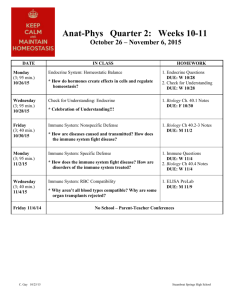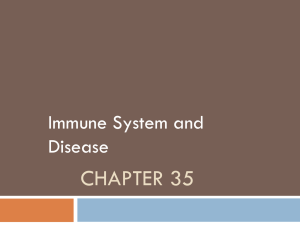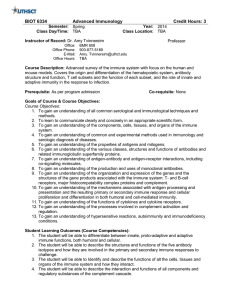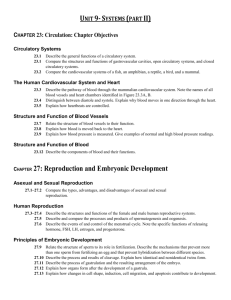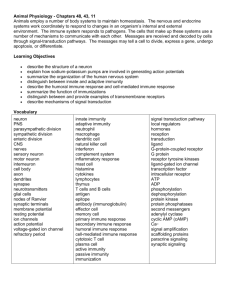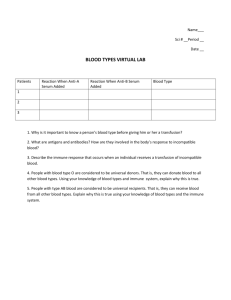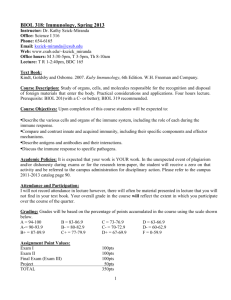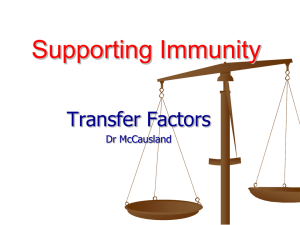BIO 265: Introduction to Immunology
advertisement
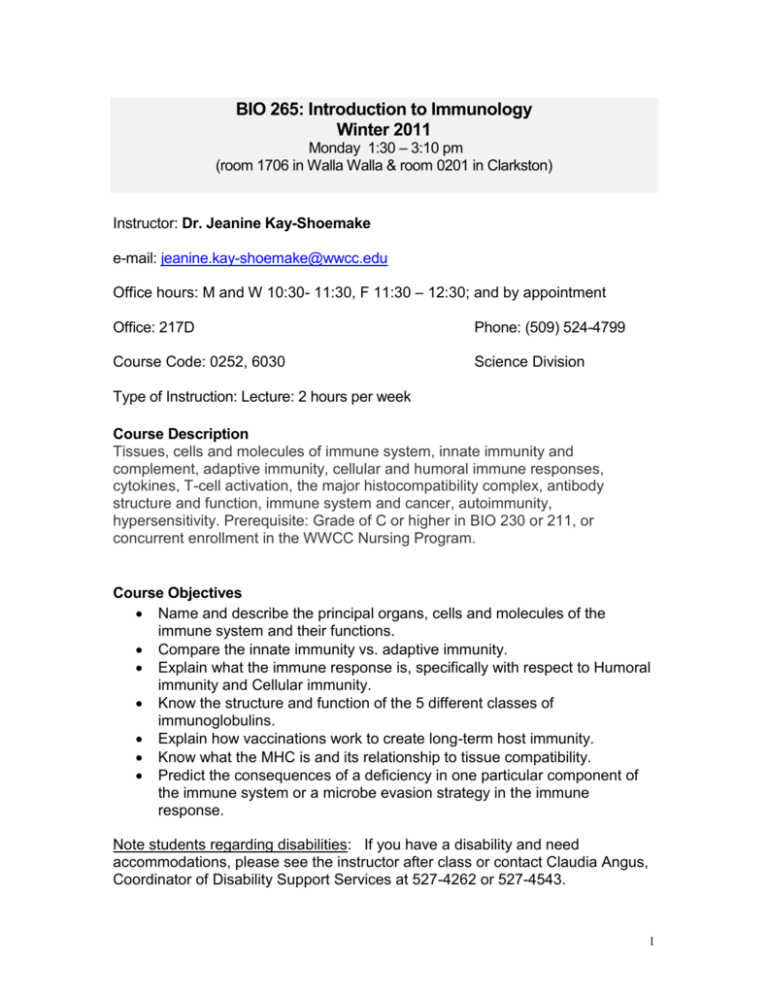
BIO 265: Introduction to Immunology Winter 2011 Monday 1:30 – 3:10 pm (room 1706 in Walla Walla & room 0201 in Clarkston) Instructor: Dr. Jeanine Kay-Shoemake e-mail: jeanine.kay-shoemake@wwcc.edu Office hours: M and W 10:30- 11:30, F 11:30 – 12:30; and by appointment Office: 217D Phone: (509) 524-4799 Course Code: 0252, 6030 Science Division Type of Instruction: Lecture: 2 hours per week Course Description Tissues, cells and molecules of immune system, innate immunity and complement, adaptive immunity, cellular and humoral immune responses, cytokines, T-cell activation, the major histocompatibility complex, antibody structure and function, immune system and cancer, autoimmunity, hypersensitivity. Prerequisite: Grade of C or higher in BIO 230 or 211, or concurrent enrollment in the WWCC Nursing Program. Course Objectives Name and describe the principal organs, cells and molecules of the immune system and their functions. Compare the innate immunity vs. adaptive immunity. Explain what the immune response is, specifically with respect to Humoral immunity and Cellular immunity. Know the structure and function of the 5 different classes of immunoglobulins. Explain how vaccinations work to create long-term host immunity. Know what the MHC is and its relationship to tissue compatibility. Predict the consequences of a deficiency in one particular component of the immune system or a microbe evasion strategy in the immune response. Note students regarding disabilities: If you have a disability and need accommodations, please see the instructor after class or contact Claudia Angus, Coordinator of Disability Support Services at 527-4262 or 527-4543. 1 Evaluation/Grading Student understanding of the material will be evaluated using lecture exams and a brief writing assignment. Points possible Exam 1 100 Exam 2 50 Exam 3 100 Exam 4 100 Total points possible 350 points Your final grade will be calculated based on the percentage of the total points you have earned out the total possible points applied to a standard grading scale, with +/- system. Percentages will be rounded to the nearest 1/100th of a percentage point for assignment of grades. Grade A AB+ B BC+ C CD+ D F GPA 4.0 3.7 3.3 3.0 2.7 2.3 2.0 1.7 1.3 1.0 0.0 Percentage range 93.00 100 % 90.00 92.99 % 87.00 89.99 % 83.00 86.99 % 80.00 82.99 % 77.00 79.99 % 73.00 76.99 % 70.00 72.99 % 67.00 69.99 % 60.00 66.99 % 0 59.99 % There will be NO extra-credit work given in this class. Testing Policy: Lecture exams will be given on the dates indicated on the attached schedule, although changes may occur. Exams will be given in the lecture classroom, and the amount of time allowed to complete the exam is approximately 1 hour. If you are unable to attend the exam at the scheduled time, you must contact me prior to exam time and provide a substantiated excuse. Make-up exams will be taken at the Testing Lab during a time that is mutually agreed upon. Make-up exams are not encouraged. Attendance I expect you to attend every lecture for the full amount of time that it is scheduled. You will be held responsible for all of the material covered in the course regardless of whether or not you were in attendance when it was presented. Additionally, you will be held to the due dates and changes to exam schedule even if you were not in class when it was announced. If you ever have to miss a class, get the notes, handouts, and assignments as soon as possible from one of your fellow students. Because there is no text for this course, it is critical that you have the notes. 2 Withdrawal Policy You may withdraw from the course without a grade through February 18. If a student has not officially dropped the class, they will be given a letter grade for the course at the end of the term. Academic Dishonesty Cheating and/or plagiarism will not be tolerated in this course. If you are caught cheating or plagiarizing, reactions on my part can range from giving you an F for the assignment or exam in question to recommending expulsion from the Community College. The following excerpt is from “Code of Conduct” in the Student Handbook: PLAGIARISM/CHEATING (1) Plagiarism is defined as the buying, borrowing, or stealing of written material for the purpose of fulfilling or partially fulfilling any assignment or task required as part of the student’s program of instruction at the college. Any student who plagiarizes shall be subject to disciplinary action. (2) Any student who aids or abets the accomplishment of such activity as defined in subsection (1) above shall also be subject to disciplinary action. (3) An instructor may take any and all reasonable action against any student who is deemed to have been guilty of plagiarism or cheating. Course of action might include, but not be limited to: (a) student dropped from course without recourse; (b) student suspended or dismissed from the college; (c) case referred to civil action. (4) An instructor taking action against any student for an act of academic misconduct shall report such action to the Dean of Instruction and the Dean of Students as soon as possible, but no later than five working days after the incident. Any student subject to action of an instructor for a violation of this section may seek review of that action by the Dean of Students, if such a request is submitted in writing within five working days from the date of the complained-of action. 3 Biology 265 Dr. Jeanine Kay-Shoemake Winter 2011 Tentative Schedule of Lecture Topics Month Jan day 3 Topic/Chapter Introduction to Immunity- 2 types, White blood cells, cytokines. Innate Immunity: Phagocytosis, Inflammation, Complement, Interferons, NK cells Jan 10 Aquired Immunity: Characteristics, Antigens, AMI and CMI (functions and cells), MHC Ag, Lymphoid tissue, Cytokines. Jan 17 Holiday- No Class Exam 1 – Take exam online 1/16-1/22 Jan 24 Cellular Immune response (CMI): T cell types and functions, MHC Ag, T cell activation, T cell mechanisms of destruction. Exam 2- Take exam online 1/25-1/30 Jan 31 Humoral Immune response (AMI): Introduction Feb 7 Humoral Immune response (AMI): Antibody molecules, Function of antibody molecules, B cell activation Feb 14 Holiday Feb 21 AMI: Primary/Secondary response, Vaccination and Vaccines, Clinical testing for antibody molecules, Immunodiagnostics and Immunotherapeutics Exam 3 – Take exam online 2/22-2/28 Mar 1 Immune Dysfunction- Overview, Autoimmunity Mar 8 Immune Dysfunction- Allergic response, Immune deficiency Mar 14 Exam 4 – Take online 3/8-3/14 4

